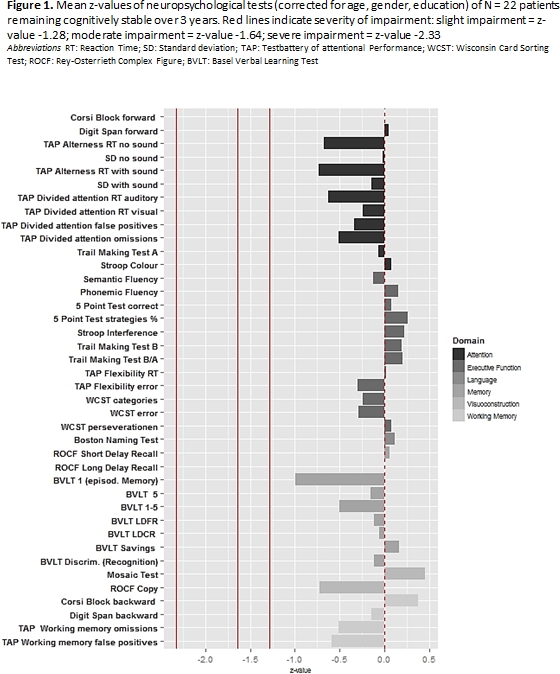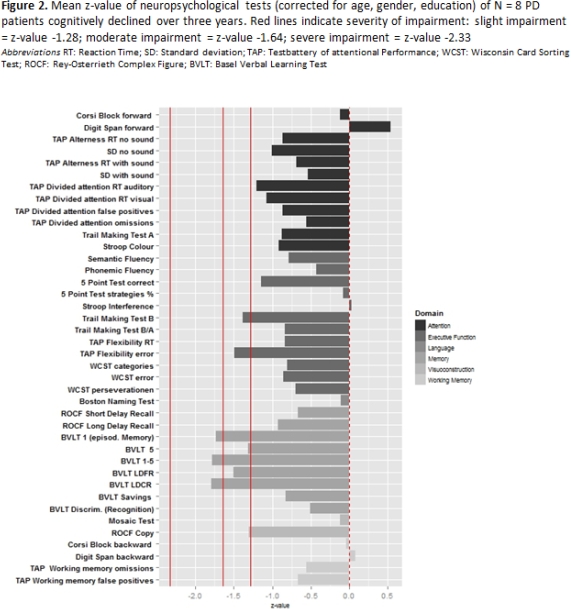Session Information
Date: Wednesday, June 22, 2016
Session Title: Parkinson's disease: Cognition
Session Time: 12:00pm-1:30pm
Location: Exhibit Hall located in Hall B, Level 2
Objective: (1) To ascertain the evolution of neuropsychological profile of PD patients with stable cognition (non-converter) in comparison to PD patients with a decline (converters) over three years. (2) To characterize the predictive influence of sample characteristics (including age, gender, education, disease duration, MMSE, severity of motor symptoms), depression, apathy and IQCODE (informant questionnaire on cognitive decline) at baseline.
Background: Cognitive alterations are common in PD even at early stages, and they progress in up to 90% to PD dementia (PDD) at late stages. The speed of cognitive decline varies and may be influenced by sample characteristics, affective disorders and by extent and type of neuropsychological deficits.
Methods: Fifty-three non demented PD patients underwent neuropsychological and neurological examination and completed questionnaires (apathy, depression) at baseline (T0). A relative filled out the IQCODE. In the still ongoing study, 31 (10f) patients have been revaluated after 3 years (T1). Diagnosis of PD-MCI and PDD was made according to current recommendations by the Movement Disorders Society.
Results: PD-MCI occurred in 16/53 patients at T0. At T1, 22 had remained stable (17 cognitively intact; 5 remaining in MCI) and 8 had converted either to MCI or PDD (5 converted to PDD, 3 converted to MCI); 1 patient had reverted to normal cognition. At baseline, the converters were significantly older (p < .05), had more severe motor signs (p < .05) and lower cognitive scores in all domains, especially in aspects of executive functions and in the memory domain (see figure 1 & 2). The IQCODE indicated a clinically relevant cognitive decline (mean = 3.36), whereas it was below the clinical cut off in the non-converter group (mean = 3.07). No significant differences were found in severity of depression, apathy. 

Conclusions: In our sample more severe cognitive and motor impairment as well as older age at T0 were associated with cognitive decline after T1; particularly impairments in memory and executive function domains were related to further cognitive decline. However, severity of depression or apathy at T0 did not differ between converters and non-converters.
To cite this abstract in AMA style:
A. Meyer, U. Gschwandtner, V. Cozac, F. Hatz, P. Fuhr. How do cognitive profiles differ in patients with Parkinson’s disease with cognitive decline in comparison to patients remaining cognitively stable? Preliminary results of a 3 years follow-up study [abstract]. Mov Disord. 2016; 31 (suppl 2). https://www.mdsabstracts.org/abstract/how-do-cognitive-profiles-differ-in-patients-with-parkinsons-disease-with-cognitive-decline-in-comparison-to-patients-remaining-cognitively-stable-preliminary-results-of-a-3-years-follow-up-study/. Accessed December 29, 2025.« Back to 2016 International Congress
MDS Abstracts - https://www.mdsabstracts.org/abstract/how-do-cognitive-profiles-differ-in-patients-with-parkinsons-disease-with-cognitive-decline-in-comparison-to-patients-remaining-cognitively-stable-preliminary-results-of-a-3-years-follow-up-study/
